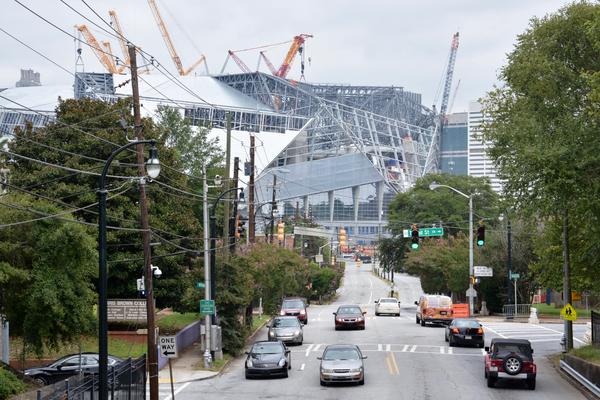Westside Group: Turn Renters Into Homeowners With Land Trust

Kate Sweeney / WABE
The Atlanta BeltLine has led to a lot of rapid development on Atlanta’s east side, and that development has led to soaring property values.
That’s something some Westside residents have watched with apprehension — and one grassroots group has quietly spent the past six years, getting ready, with a unique strategy.
Third-Generation Vine City
Bashel Lewis was 12 years old in 2008. Like many of his neighbors in Vine City and English Avenue, he, his mother and grandmother were lifelong residents. Also, like many of them, they were renters. And, like many people that year, the house they were living in was foreclosed on.
“And so, we got an eviction letter,” Lewis says.
His mother never once considered moving them away to an affordable suburban Atlanta neighborhood like some neighbors were doing. They lived in Vine City. And they were going to stay there.
The days that followed were rough.
“We couch-surfed; we stayed with friends; we stayed with family members,” Lewis recalls. “It was very important to [my mother] that we stay where we’re from.”
That experience galvanized him. The next year, Lewis became the youngest member of a new grassroots group, the Westside Atlanta Land Trust, or WALT for short.
Turning Renters Into Homeowners
“We know that the new [Atlanta Falcons] stadium is coming; that’s clear,” says Gwen Marshall, a WALT member and Castleberry Hill resident.
WALT has spent the past seven years setting the stage for the creation of a community land trust.
They’ve watched the construction cranes rise on Northside Drive. These days, you can see them from anywhere in the neighborhood. Along with the new Falcons stadium, there’s the planned Westside BeltLine Trail.
Meanwhile, Marshall says she’s seen real estate speculators coming in.
“Properties are being purchased here, and there are homes that are going to go up that are going to price [out] a lot of the individuals that are already here. … The motivation is, we want to stay.”
One way for longtime low-income residents to do that is by creating a community land trust, which turns renters into homeowners.
Marshall explains how it works:
“The community land trust owns the land, and the individual or family can purchase the house that’s on top of it.”
Again: The homeowner owns the house, only. The land-trust nonprofit owns the land itself. That means the house is cheaper, and when property values soar, as they’re expected to, the homeowner is shielded from high property taxes.
The homeownership part of the equation would mean a great deal in this part of town. Right now, nearly 86 percent of people living in Vine City and English Avenue rent, according to the Atlanta Regional Commission.
And this makes them vulnerable, says Melora Hiller, CEO of Grounded Solutions Network, an advocacy group for affordable housing.
Hiller calls homeownership “the No. 1 source of asset building for low-income people and people of color.”
“That’s the place where you can change the generational outcomes for families,” Hiller says. “Families who’ve been poor historically? Homeownership is a key way out of that.”
More Than A Land Trust
There are about 250 community land trusts around the country. So far, WALT has purchased 10 properties in several Westside neighborhoods.
One sweltering summer afternoon, a group of WALT members led a walking tour of some of those properties.
According to the Atlanta Regional Commission, more than a third of houses in English Avenue and Vine City are vacant. And that’s visible on this walk. The kudzu grows so thick in some lots you can’t even tell there are houses beneath.
Lots with abandoned houses attract vermin and illegal activity, but WALT volunteers keep the nonprofit’s properties mowed and tidy in exchange for sweat equity — the chance to one day purchase a house at a reduced rate.
The group also leads neighborhood forums, including a homeownership class, and engages local high school and university students to take part in its neighborhood research projects.
WALT member and English Avenue resident Tara Franklin-Mitchell says all this engagement makes a huge difference:
“There’s a sense of defeat that happens in neighborhoods like this, where you know, you ask and you beg for things to happen. You ask for code enforcement. You ask for more police presence. … You get to the point where, you know, people check out of the neighborhood. They feel like nothing’s going to be resolved anyway.”
But this time, WALT is banking on real change. They’re asking the city for relief on back taxes on some of the properties they’ve bought. To make the community land trust a go, they also need a change in the way the city assesses property taxes.
The city of Atlanta had no comment for this story.
Coming Home
These are the kinds of challenges Bashel Lewis is eager to help out with. The youngest member of WALT is now 20 and a student at Pitzer College in California. It’s a nice place, but he says it’s not home.
“I love the Vine City and English Ave community so much,” he says, “because it’s a place where I can be unapologetically black.”
He says spending the past year-and-change at a predominantly white setting has been something of a shock. It’s made him feel even luckier to have grown up where he did, despite the hardships he grew up with — such as realizing the academic education he grew up with left him “13 steps behind everyone else.”
Despite that, he says, “I came from a community that was all about blackness and black rights. That was very empowering. It’s like a village to me, and I love it so much.”
He’s counting the days until graduation in 2019, when he can return, to try to help ensure Atlanta’s Westside stays that way for the next generation.
9(MDAxODM0MDY4MDEyMTY4NDA3MzI3YjkzMw004))








